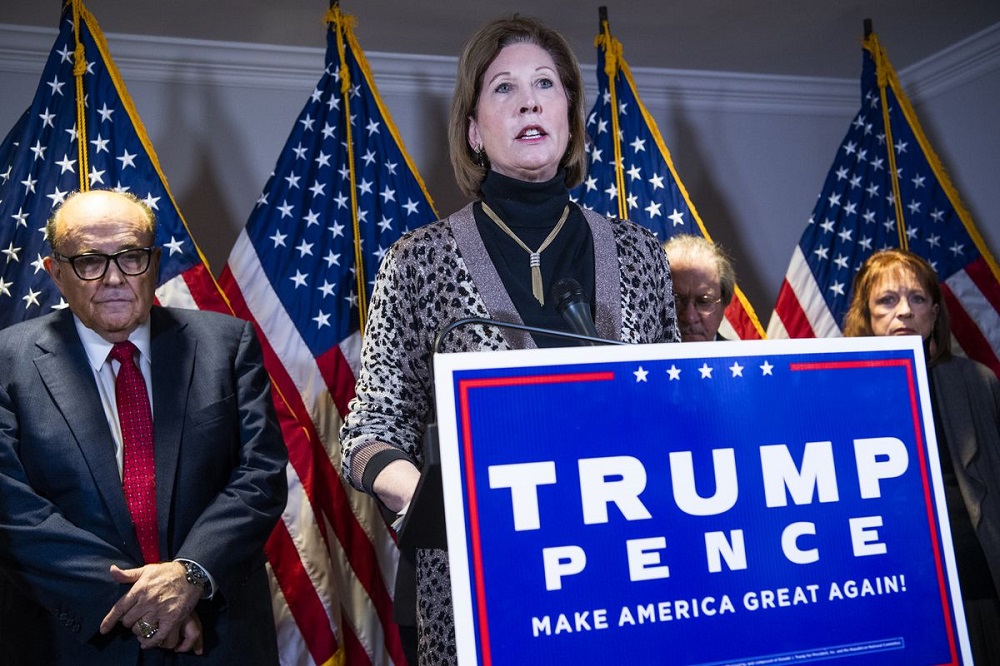
OPINION: This article contains commentary which may reflect the author’s opinion
A Dallas lawyer and former Trump attorney sued Verizon this week to stop records and data from being disclosed to the congressional committee investigating the Jan. 6 violence at the Capitol.
A subpoena was issued in January 2022 by the House Select Committee to Investigations January 6th against several close allies of the former president, including his former attorney Sidney Powell, who is a Texas member of the bar with a Dallas office.
It asked Powell if she had any evidence to support Trump’s claims of election fraud in its letter to her.
Court documents state that Powell also maintains that Verizon’s phone records that were subpoenaed in connection with the Jan. 6 investigation shouldn’t be made public due to the attorney-client privilege and a violation of her First Amendment rights.
The attorney for Powell says his client had “no involvement in the events of January 6th, yet the DOJ is seeking records that contain client privileges held by numerous clients.”
In addition, the lawsuit asserts that subpoena of Verizon’s phone records on Feb. 4 violated the Stored Communications Act, which says an electronic provider “shall not knowingly divulge to any person or entity the contents of a communication while in electronic storage to that service.”
Additionally, it is alleged that the subpoena violates the Telecommunications Act of 1996 by searching for the “contents of a communication while in electronic storage” without the authorization of Powell or the law.
Moreover, Powell believes her First Amendment rights have been violated as the subpoena is too broad and there is no way a “governmental interest could be sufficiently compelling to permit it to delve through every phone call place or received” by Powell over the course of three months.
Additionally, the lawsuit asserts that the subpoena is an unlawful search and seizure in violation of the Fourth Amendment.
At the end of the day, Powell’s lawsuit claims Verizon is acting beyond the company’s authority, and that the subpoena it is being served is both unlawful and unenforceable.
Last month, the Supreme Court unanimously rejected Trump’s bid to withhold the documents from a congressional panel until the case is resolved by the courts.
It had been Trump’s lawyers’ hope that court proceedings would be prolonged and documents would remain on hold.
As a result of the high court’s decision, there are no legal hurdles to the National Archives and Records Administration providing the documents. The documents include presidential diaries, visitor logs, draft speeches, and handwritten notes from the files of Mark Meadows, the former chief of staff of President Trump.
A request from the Biden White House prompted the House committee to defer attempts to obtain some documents. According to the current administration, giving the committee all of the Trump administration documents could undermine national security and executive privilege.
Clarence Thomas stands alone among the justices in saying he would have granted Trump’s request to postpone the release of the documents.
Trump’s attorneys had asked the high court to reverse the Washington appeals court’s decision and block the release of the records despite Biden waiving executive privilege.
The court stated in an unsigned opinion that there are ‘serious and substantial concerns’ over whether a former president could get a court order to prevent disclosure of certain records during his time in office.
The appeals court nonetheless held that Trump’s assertion of privilege would fail under any circumstance, ‘even if he were the incumbent.’
In a statement, it said the question of a former president claiming executive privilege would have to be discussed at a later date.
According to the court, the appeals court’s conclusion downplayed a former president’s interests, implying that his successor could in essence ignore those claims.
Justice Kavanaugh, who was nominated by former President Donald Trump, wrote an aside arguing that ‘a former President must be able to successfully invoke the Presidential communications privilege for communications that occurred during his Presidency, even if the current President does not support the privilege claim.’
In spite of this, Kavanaugh did not object to the decision.
In the days leading up to and after the riot, Trump offered theories about election fraud and said that the ‘real insurrection’ occurred when he lost to Biden on Election Day.
As they had done before lower courts, Trump’s lawyers had urged the justices to intervene, insisting that the case was relevant to all future occupants of the White House. Former presidents had ‘a clear right to protect their confidential records from premature dissemination,’ Trump’s lawyers argued.
‘Congress cannot engage in meandering fishing expeditions in the hopes of embarrassing President Trump or exposing the President´s and his staff’s sensitive and privileged communications `for the sake of exposure,´’ they continued.
A high court brief filed by the House committee said that although the facts are ‘unprecedented,’ the decision was ‘not a difficult one.’
The court did not explain why its action was taken at this point in time. The National Archives, however, informed the appeals court and Trump’s lawyers that it would turn over some documents that it believes were not part of the court case in the absence of a new order from the court.
Additionally, on Wednesday, members of the House Committee investigating the Capitol violence issued subpoenas to leaders of a group that appeared at events promoting the theory that there was fraud in the 2020 election.
Source: The Republic Brief